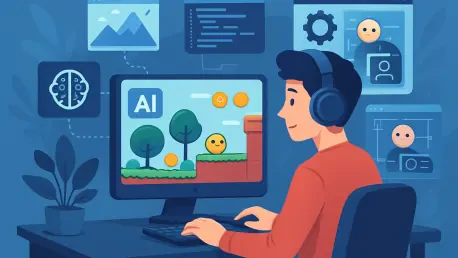In a world where video game development often demands immense time and resources, a groundbreaking collaboration is emerging to change the landscape entirely. Imagine a platform where developers can craft intricate 3D worlds and assets not through tedious coding or manual design, but by simply describing their vision in natural language. This is no longer a distant dream but a tangible reality, thanks to an innovative partnership between Atlas AI, a startup focused on AI-driven tools for game creation, and Google Cloud, a titan in scalable infrastructure. Their combined efforts are introducing an AI-native solution that promises to accelerate the production of virtual environments, making the process faster, more intuitive, and accessible to a broader range of creators. This alliance is poised to reshape how the gaming industry approaches content creation, sparking excitement and curiosity about the future of interactive entertainment.
Transforming the Creative Process with AI
Revolutionizing 3D Content Creation
The core of this partnership lies in Atlas AI’s pioneering platform, which leverages artificial intelligence to streamline the creation of 3D content for professional game developers. Unlike traditional methods that require extensive manual input and technical expertise, this system allows creators to input natural language prompts, transforming ideas into detailed, game-ready assets almost instantly. Starting with mood boards or style references, developers can generate realistic environments and objects up to 200 times faster than conventional approaches. These assets come equipped with clean geometric models, semantic segmentations, and UV mappings, ensuring seamless integration with leading graphics engines like Unreal Engine and Unity. This dramatic reduction in production time not only boosts efficiency but also opens doors for smaller studios or independent developers who may lack the resources for large-scale projects, democratizing access to high-quality game design tools.
Enhancing Workflow with Multi-Agent Systems
Beyond isolated asset creation, Atlas AI introduces a multi-agent system that acts as a creative co-pilot for developers, setting it apart from other generative AI tools. This sophisticated approach focuses on production-scale workflows, enabling the simultaneous development of multiple elements within a virtual world. By orchestrating various AI agents to collaborate on tasks, the platform ensures that entire environments, from sprawling landscapes to intricate character designs, are built cohesively and efficiently. The system’s ability to interpret complex instructions through natural language means that developers can focus more on creative vision rather than technical hurdles. Supported by Google Cloud’s Vertex AI for model orchestration, this technology provides a robust foundation for handling the computational demands of such intricate processes, ensuring reliability even at scale. This synergy between AI agents and human creativity marks a significant shift in how game development pipelines are structured, fostering innovation at every step.
Shaping the Future of Interactive Entertainment
Scalability and Industry Impact
A critical component of this collaboration is the scalability offered by Google Cloud’s infrastructure, which Atlas AI identifies as essential to realizing its ambitious vision. Jack Buser, Google Cloud’s global director for games, has emphasized the importance of this partnership in pioneering “AI-native” game development through agentic design systems. This infrastructure empowers developers to create dynamic, evolving virtual worlds that can adapt and grow, potentially redefining player experiences in interactive entertainment. The ability to handle vast computational loads ensures that even the most ambitious projects can be executed without compromise, paving the way for richer, more immersive games. Early feedback from industry giants like Square Enix, known for iconic franchises such as Final Fantasy, highlights the platform’s seamless integration with customized workflows and its delivery of high-quality, performance-optimized results, reinforcing its transformative potential across the gaming sector.
Collaborative Innovation and Accessibility
Further solidifying its impact, Atlas AI’s platform is currently accessible through a closed beta program, offering free early access to qualified game developers and studios. This initiative not only allows participants to explore the generative pipeline for 3D content creation but also invites valuable feedback to refine and enhance the system. By involving real-world users in its development, the platform ensures that it evolves to meet the practical needs of the industry. Additionally, the emphasis on natural language inputs lowers the barrier to entry, enabling creators with limited technical skills to engage in complex 3D modeling. This democratization of technology could inspire a new wave of talent in game development, particularly among independent creators and smaller teams. The partnership’s alignment with broader industry trends toward cloud-based solutions also signals a shift in how computational challenges are addressed, positioning AI-driven tools as indispensable for future advancements in gaming.
Reflecting on a Game-Changing Milestone
Looking back, the collaboration between Atlas AI and Google Cloud marked a pivotal moment in the evolution of video game development. Their combined efforts delivered an AI-native platform that redefined efficiency, enabling developers to craft intricate virtual worlds with unprecedented speed and ease. The integration of scalable infrastructure with innovative multi-agent systems provided a glimpse into a future where creativity and technology worked hand in hand. Industry feedback, exemplified by endorsements from major players like Square Enix, validated the platform’s ability to meet high standards of quality and performance. As this technology continued to develop through beta testing and user input, it became clear that such advancements were not just tools but catalysts for broader change. Moving forward, the focus should remain on expanding access to these solutions, ensuring that developers of all backgrounds can harness AI to push the boundaries of interactive storytelling and immersive experiences.









